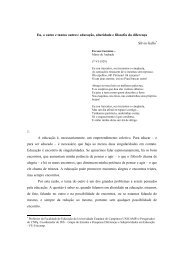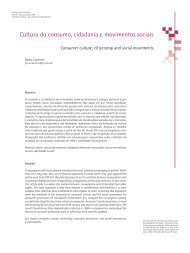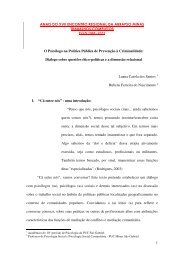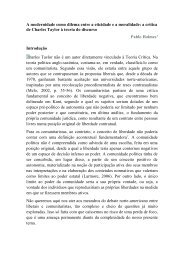EXECUTIONS
Extrajudicial, Summary or Arbitrary Executions - Gajop
Extrajudicial, Summary or Arbitrary Executions - Gajop
- No tags were found...
You also want an ePaper? Increase the reach of your titles
YUMPU automatically turns print PDFs into web optimized ePapers that Google loves.
43of its members for the protection of the person, and the person's and41property.” One hundred and fifty years later, the United Nations'Universal Declaration of Human Rightsin which civil and political rightsfrom the classic liberal tradition figure alongside socio-economic rightsfrom the modern socialist perspectiverepeats in its article 3: "Everyindividual has the right to life, liberty and personal security." (emphasisadded).In other words, for reasons that are understandable, personalsecurity as a human right, when it appears activist literature, refers to thepersonal and moral integrity of political prisoners, or even of commonprisoners, when violated by state agents. This focus produces a curiousomission: the fact that the ordinary citizen also has the right to security andthat this right is frequently violated by criminals. Here, it is important,once again, to avoid misunderstanding, to emphasize two points. The firstis that this assertion in no way constitutes a defense of the idiotic slogan"what about the human rights of the victim?" used by enemies of humanrights to discredit the arduous task of rights defense in a country like Brazil.The second is that by no means does this recognition advocate for the useof the same yardstick to judge human rights violations committed bydictatorial regimes and those committed by criminals.42This leads us to a text by Colombian author Rodrigo Uprimmy,which emphasizes the need for a specific focus on violations committed bystate agents. The reasons for this this focus are historicalhuman rightsguarantees were conceived as a means of checking the power of thestatelegalstates are the actors who assume obligations throughinternational treaties to respect human rightsand practicalwhen a thirdparty commits an act that threatens an individual's rights, she or he alwayshas recourse to state authority to protect the right or remedy the violation.But when the state violates rights, the citizen has no mechanisms ofremedies other than human rights. Thus, one agrees with Uprimmy whenhe writes, "the concept of human rights violation, in order that it not lose43its specificity, should be reserved to actions by the state.”41. Ibid. 374.42. Uprimmy, Rodrigo. "Violência, Ordem Democrática e Direitos Humanos", in: Lua Nova, (SãoPaulo, CEDEC, 1993), n. 30.43. Ibid., 103-104













